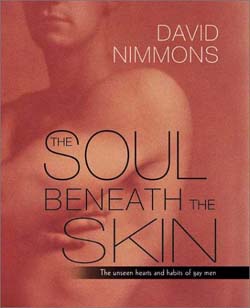
|
The Soul Beneath the Skin , David Nimmons, St. Martin's Press, 2002 (224 pp.)  Let me begin with a confession: I'm cheap. (No, not that way, although some may beg to differ.) I dislike paying full retail hardcover price for books, as a glimpse of my disheveled bookshelves would quickly prove. (To all of you who paid full fare for my new book, Leading the Parade, I remain eternally grateful.) But I heard so much "buzz" this season from so many people about one book that I had to purchase a copy for myself to see what information lay within. In retrospect, it was money well spent.
Let me begin with a confession: I'm cheap. (No, not that way, although some may beg to differ.) I dislike paying full retail hardcover price for books, as a glimpse of my disheveled bookshelves would quickly prove. (To all of you who paid full fare for my new book, Leading the Parade, I remain eternally grateful.) But I heard so much "buzz" this season from so many people about one book that I had to purchase a copy for myself to see what information lay within. In retrospect, it was money well spent.
David Nimmons doesn't say much that gay men don't collectively know inThe Soul Beneath the Skin, but he assembles it in a way I haven't seen before. Nimmons facilely switches from dry, esoteric sociological reports to add his own fresh, tres gai voice when he reminds us that we gay men have found ways to live and interact without regularly resorting to violence; that our levels of volunteerism within and outside our community exceed those of our straight brothers; and that our heightened emphasis on friends/family of choice, our search for bliss (sexual and otherwise), and our relationships with heterosexual women set us apart from other men. I feared this book was too Pollyanna-ish until I reached page 188, where Nimmons finally acknowledges the ways in which we have tended to mistreat each other with attitude, rejection based on body type, and general Bitchy Queenness. (Perhaps we've heard so many negative comments about ourselves for so long that Nimmons wanted to stress some positive traits first, and/or reinterpret them in ways that they could be construed positively.) While I enjoyed the book very much (especially the last two chapters, where Nimmons explores ways in which we can create a new world with one another), I think it needed more assistance in the copy-editing phase, and several awkward sentences jar even the most accommodating reader. Fortunately, I found Nimmons's thinking bright and well-organized, and his writing style exhibits a nifty, breezy tone that kept his book from being pedantic and ponderous (and unread). While The Soul Beneath the Skin primarily addresses two groups (gay men's relationships with each other and, to a lesser degree, with straight women), Nimmons (unconsciously?) omitted two others. We need to honor lesbians as our strong, brave sisters in common struggle against a frequently homophobic society, and we need to recognize that not all straight men are "the enemy." (And what role do bisexuals play among all of this?) Lesbian friends certainly played crucial roles in helping me to claim my sexuality (thank you, Mary and Dani), and many straight men have served as my supportive allies. Longtime gay elder Harry Hay has spent most of his life asking, "What are we [gay folk] for?" While Nimmons is not the first to explore these issues, I believe he provides some answers (as well as some questions) that would please Hay tremendously. Clearly, gay men can teach the rest of the world many things about love and openness, and sex and sexuality, that we have learned in our own hard-fought struggles. Nimmons, much to his credit, provides no pat answers, but believes we need to dialogue about finding ways to create what we collectively want. Toward that end, groups have formed in several American cities to discover ways we can lovingly meet our needs that help us to connect with one another instead of competing against or alienating each other. Some discussion of these ideas can be found on the website of his group, Manifest Love, at www.manifestlove.org. Personally, I hope local/regional Manifest Love groups catch fire in our communities. I was never quite ready to become a Radical Faerie (a bit too avant garde for me), but I am a graduate of The Experience (now defunct), and anything that helps us construct more loving ways to support one another can only be good. I plan to explore whether the gay/bisexual men in my new hometown of Reno, Nevada (and its environs) are interested in such a group (if you are interested, please contact me at pauldcain@aol.com), and I hope you will consider entering into discussion with your friends to see if your community's collective needs are being met. As Nimmons points out, we have the power to create the communities we want; if our needs are not being met, we can either whine about it, or we can create (or re-create) institutions that serve our needs. If the bar/bath/club/circuit scene isn't enriching your life, Nimmons has faith (as do I) that perhaps you and your neighbors can create something that will! |
|
© 1997-2002 BEI
The sexual orientation of individuals pictured in and writers for
Gay Today should not be assumed.